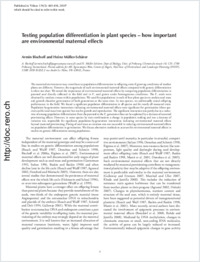Testing population differentiation in plant species – how important are environmental maternal effects
- Bischoff, Armin Dept of Biology, Univ. of Fribourg, Switzerland - Agrocampus West, Centre of Angers, Natl Inst. of Horticulture and Landscape Planning (INHP), France
- Müller-Schärer, Heinz Dept of Biology, Univ. of Fribourg, Switzerland
-
2010
Published in:
- Oikos. - 2010, vol. 119, no. 3, p. 445-454
English
The maternal environment may contribute to population differentiation in offspring traits if growing conditions of mother plants are different. However, the magnitude of such environmental maternal effects compared with genetic differentiation is often not clear. We tested the importance of environmental maternal effects by comparing population differentiation in parental seed directly collected in the field and in F1 seed grown under homogeneous conditions. The F1 seeds were obtained by random crosses within populations. We used five populations in each of four plant species to analyse seed mass and growth chamber germination of both generations at the same time. In two species, we additionally tested offspring performance in the field. We found a significant population differentiation in all species and for nearly all measured traits. Population-by-generation interactions indicating environmental maternal effects were significant for germination (three species) and for seed mass (two species) but not for growth and reproduction. The significant interaction was partly due to a reduction of among-population differentiation from the parental to the F1 generation that can be explained by a decrease of maternal provisioning effects. However, in some species by trait combinations a change in population ranking and not a decrease of variation was responsible for significant population-by-generation interactions indicating environmental maternal effects beyond maternal provisioning. Fitting of seed mass as covariate was not successful in reducing environmental maternal effects on population differentiation in germination. We discuss alternative methods to account for environmental maternal effects in studies on genetic differentiation among populations.
- Faculty
- Faculté des sciences et de médecine
- Department
- Département de Biologie
- Language
-
- English
- Classification
- Biological sciences
- License
-
License undefined
- Identifiers
-
- RERO DOC 18100
- DOI 10.1111/j.1600-0706.2009.17776.x
- Persistent URL
- https://folia.unifr.ch/unifr/documents/301630
Statistics
Document views: 136
File downloads:
- pdf: 363
